Values, Ethics and Working Collaboratively Report - [Module Name]
VerifiedAdded on 2022/12/23
|12
|3879
|75
Report
AI Summary
This report delves into the critical roles of ethics, values, and collaborative working within organizations. It begins by defining ethics, exploring influencing factors, and highlighting the importance of workplace ethics, including relevant UK laws. The report then discusses obligations towards society and the practical aspects of collaborative working, including strategies, guiding values, required interpersonal skills, and benefits. It also addresses promoting equality and diversity, integrating British values, and the consequences of poor collaboration. The report emphasizes the need for ethical practices and collaborative approaches to achieve organizational goals effectively and efficiently. The report includes a case study of Barclays Plc and its unethical practices and how it affected the organization's reputation. Furthermore, it explains the legal rights people have in GDPR.
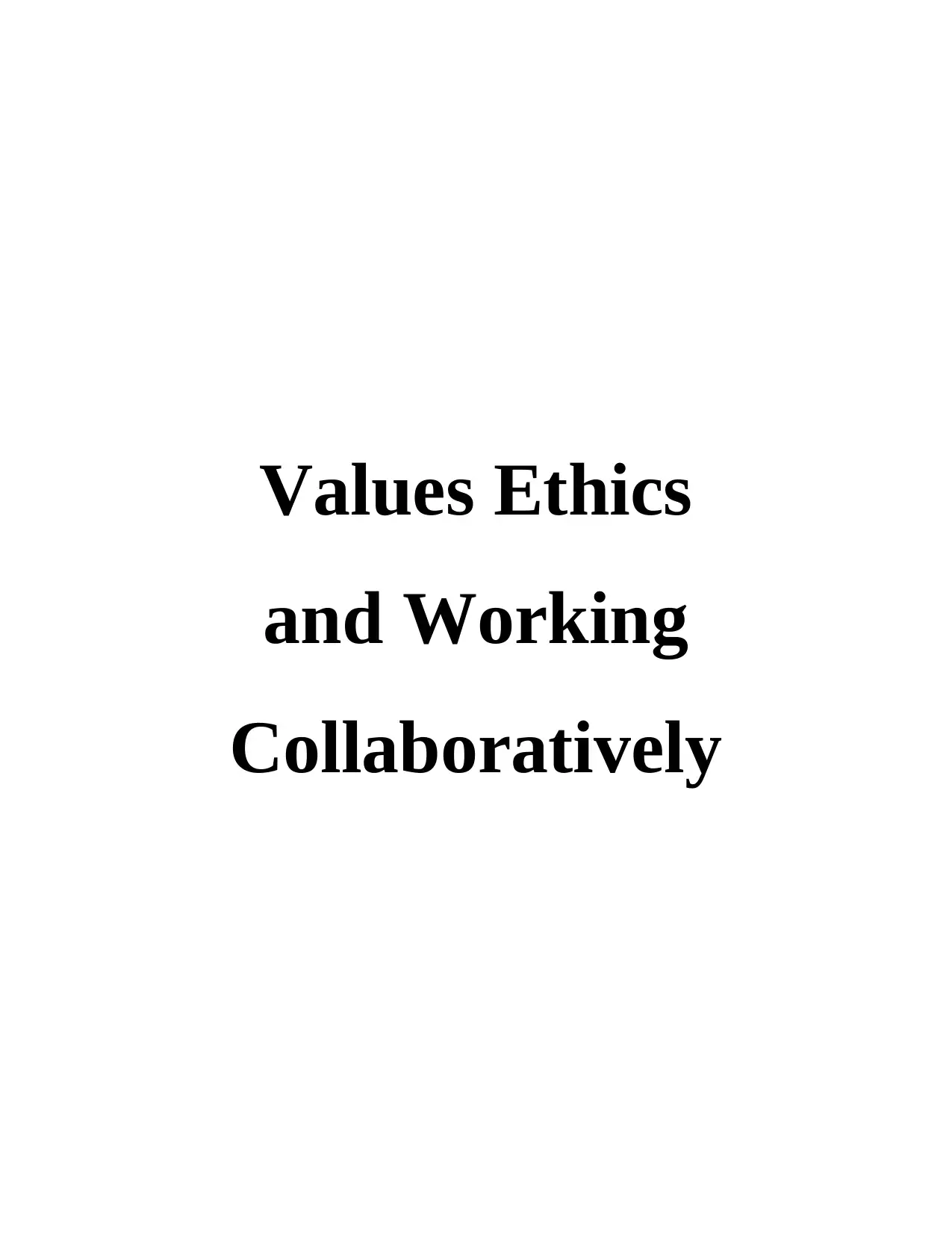
Values Ethics
and Working
Collaboratively
and Working
Collaboratively
Paraphrase This Document
Need a fresh take? Get an instant paraphrase of this document with our AI Paraphraser
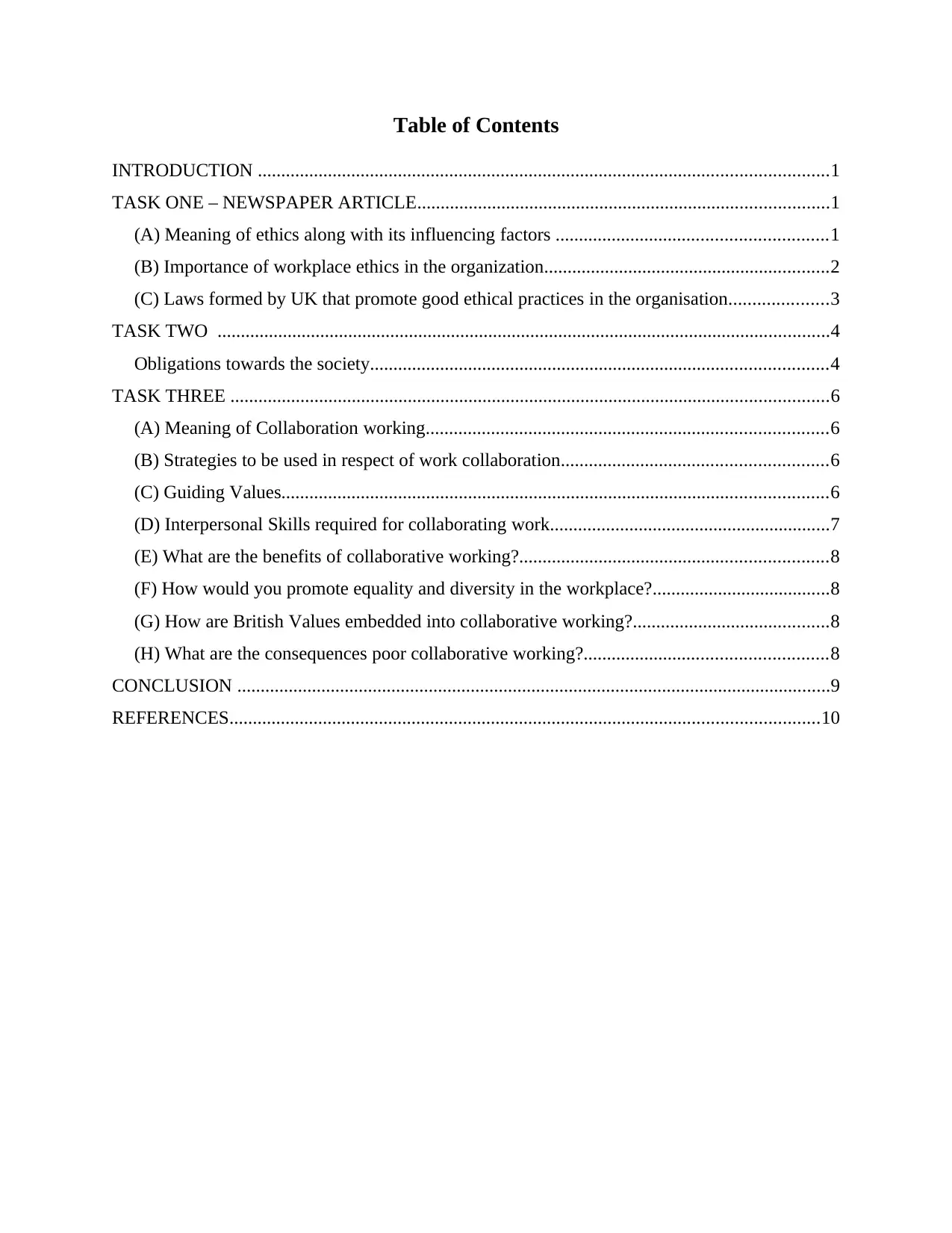
Table of Contents
INTRODUCTION ..........................................................................................................................1
TASK ONE – NEWSPAPER ARTICLE........................................................................................1
(A) Meaning of ethics along with its influencing factors ..........................................................1
(B) Importance of workplace ethics in the organization.............................................................2
(C) Laws formed by UK that promote good ethical practices in the organisation.....................3
TASK TWO ...................................................................................................................................4
Obligations towards the society..................................................................................................4
TASK THREE ................................................................................................................................6
(A) Meaning of Collaboration working......................................................................................6
(B) Strategies to be used in respect of work collaboration.........................................................6
(C) Guiding Values.....................................................................................................................6
(D) Interpersonal Skills required for collaborating work............................................................7
(E) What are the benefits of collaborative working?..................................................................8
(F) How would you promote equality and diversity in the workplace?......................................8
(G) How are British Values embedded into collaborative working?..........................................8
(H) What are the consequences poor collaborative working?....................................................8
CONCLUSION ...............................................................................................................................9
REFERENCES..............................................................................................................................10
INTRODUCTION ..........................................................................................................................1
TASK ONE – NEWSPAPER ARTICLE........................................................................................1
(A) Meaning of ethics along with its influencing factors ..........................................................1
(B) Importance of workplace ethics in the organization.............................................................2
(C) Laws formed by UK that promote good ethical practices in the organisation.....................3
TASK TWO ...................................................................................................................................4
Obligations towards the society..................................................................................................4
TASK THREE ................................................................................................................................6
(A) Meaning of Collaboration working......................................................................................6
(B) Strategies to be used in respect of work collaboration.........................................................6
(C) Guiding Values.....................................................................................................................6
(D) Interpersonal Skills required for collaborating work............................................................7
(E) What are the benefits of collaborative working?..................................................................8
(F) How would you promote equality and diversity in the workplace?......................................8
(G) How are British Values embedded into collaborative working?..........................................8
(H) What are the consequences poor collaborative working?....................................................8
CONCLUSION ...............................................................................................................................9
REFERENCES..............................................................................................................................10
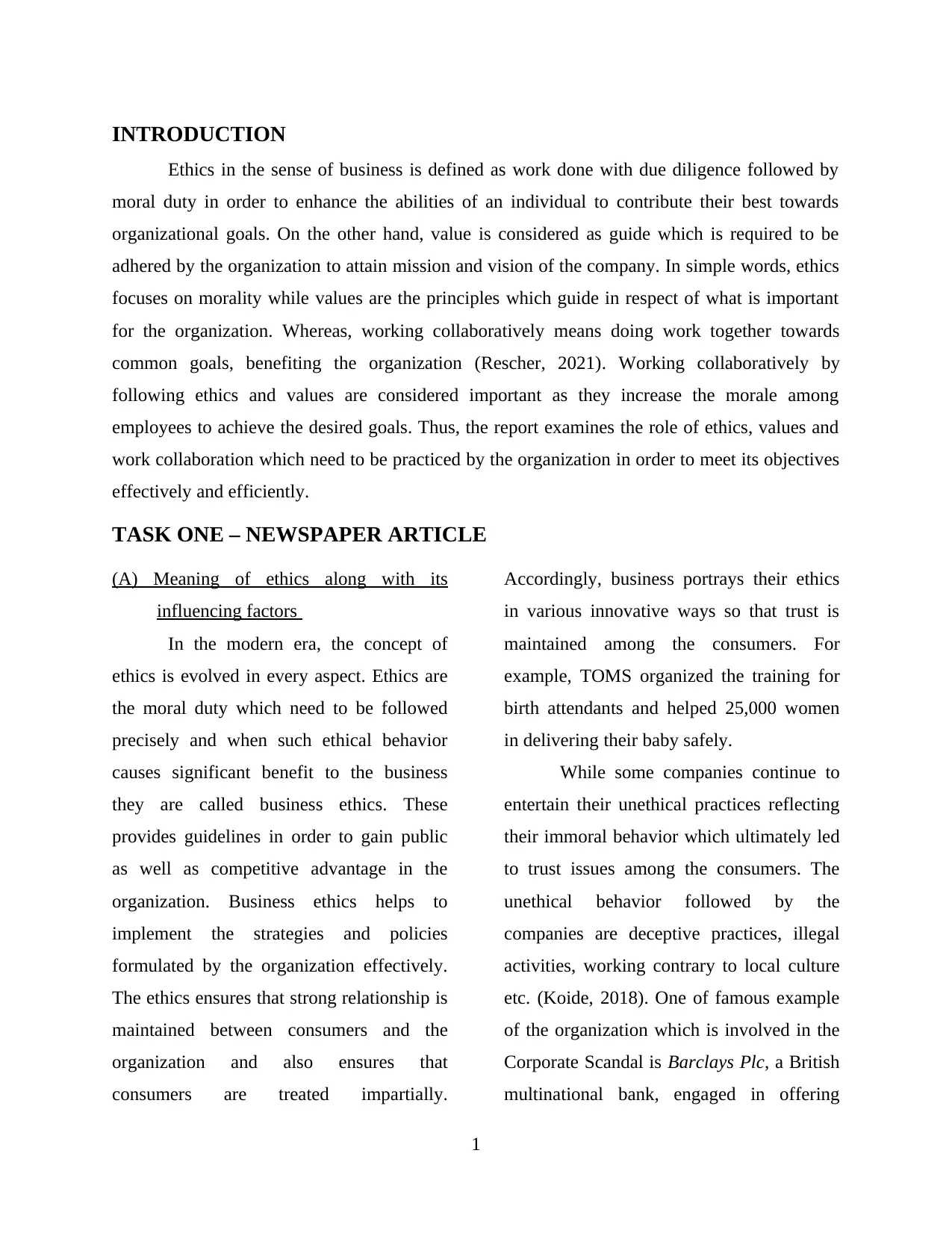
INTRODUCTION
Ethics in the sense of business is defined as work done with due diligence followed by
moral duty in order to enhance the abilities of an individual to contribute their best towards
organizational goals. On the other hand, value is considered as guide which is required to be
adhered by the organization to attain mission and vision of the company. In simple words, ethics
focuses on morality while values are the principles which guide in respect of what is important
for the organization. Whereas, working collaboratively means doing work together towards
common goals, benefiting the organization (Rescher, 2021). Working collaboratively by
following ethics and values are considered important as they increase the morale among
employees to achieve the desired goals. Thus, the report examines the role of ethics, values and
work collaboration which need to be practiced by the organization in order to meet its objectives
effectively and efficiently.
TASK ONE – NEWSPAPER ARTICLE
(A) Meaning of ethics along with its
influencing factors
In the modern era, the concept of
ethics is evolved in every aspect. Ethics are
the moral duty which need to be followed
precisely and when such ethical behavior
causes significant benefit to the business
they are called business ethics. These
provides guidelines in order to gain public
as well as competitive advantage in the
organization. Business ethics helps to
implement the strategies and policies
formulated by the organization effectively.
The ethics ensures that strong relationship is
maintained between consumers and the
organization and also ensures that
consumers are treated impartially.
Accordingly, business portrays their ethics
in various innovative ways so that trust is
maintained among the consumers. For
example, TOMS organized the training for
birth attendants and helped 25,000 women
in delivering their baby safely.
While some companies continue to
entertain their unethical practices reflecting
their immoral behavior which ultimately led
to trust issues among the consumers. The
unethical behavior followed by the
companies are deceptive practices, illegal
activities, working contrary to local culture
etc. (Koide, 2018). One of famous example
of the organization which is involved in the
Corporate Scandal is Barclays Plc, a British
multinational bank, engaged in offering
1
Ethics in the sense of business is defined as work done with due diligence followed by
moral duty in order to enhance the abilities of an individual to contribute their best towards
organizational goals. On the other hand, value is considered as guide which is required to be
adhered by the organization to attain mission and vision of the company. In simple words, ethics
focuses on morality while values are the principles which guide in respect of what is important
for the organization. Whereas, working collaboratively means doing work together towards
common goals, benefiting the organization (Rescher, 2021). Working collaboratively by
following ethics and values are considered important as they increase the morale among
employees to achieve the desired goals. Thus, the report examines the role of ethics, values and
work collaboration which need to be practiced by the organization in order to meet its objectives
effectively and efficiently.
TASK ONE – NEWSPAPER ARTICLE
(A) Meaning of ethics along with its
influencing factors
In the modern era, the concept of
ethics is evolved in every aspect. Ethics are
the moral duty which need to be followed
precisely and when such ethical behavior
causes significant benefit to the business
they are called business ethics. These
provides guidelines in order to gain public
as well as competitive advantage in the
organization. Business ethics helps to
implement the strategies and policies
formulated by the organization effectively.
The ethics ensures that strong relationship is
maintained between consumers and the
organization and also ensures that
consumers are treated impartially.
Accordingly, business portrays their ethics
in various innovative ways so that trust is
maintained among the consumers. For
example, TOMS organized the training for
birth attendants and helped 25,000 women
in delivering their baby safely.
While some companies continue to
entertain their unethical practices reflecting
their immoral behavior which ultimately led
to trust issues among the consumers. The
unethical behavior followed by the
companies are deceptive practices, illegal
activities, working contrary to local culture
etc. (Koide, 2018). One of famous example
of the organization which is involved in the
Corporate Scandal is Barclays Plc, a British
multinational bank, engaged in offering
1
⊘ This is a preview!⊘
Do you want full access?
Subscribe today to unlock all pages.

Trusted by 1+ million students worldwide
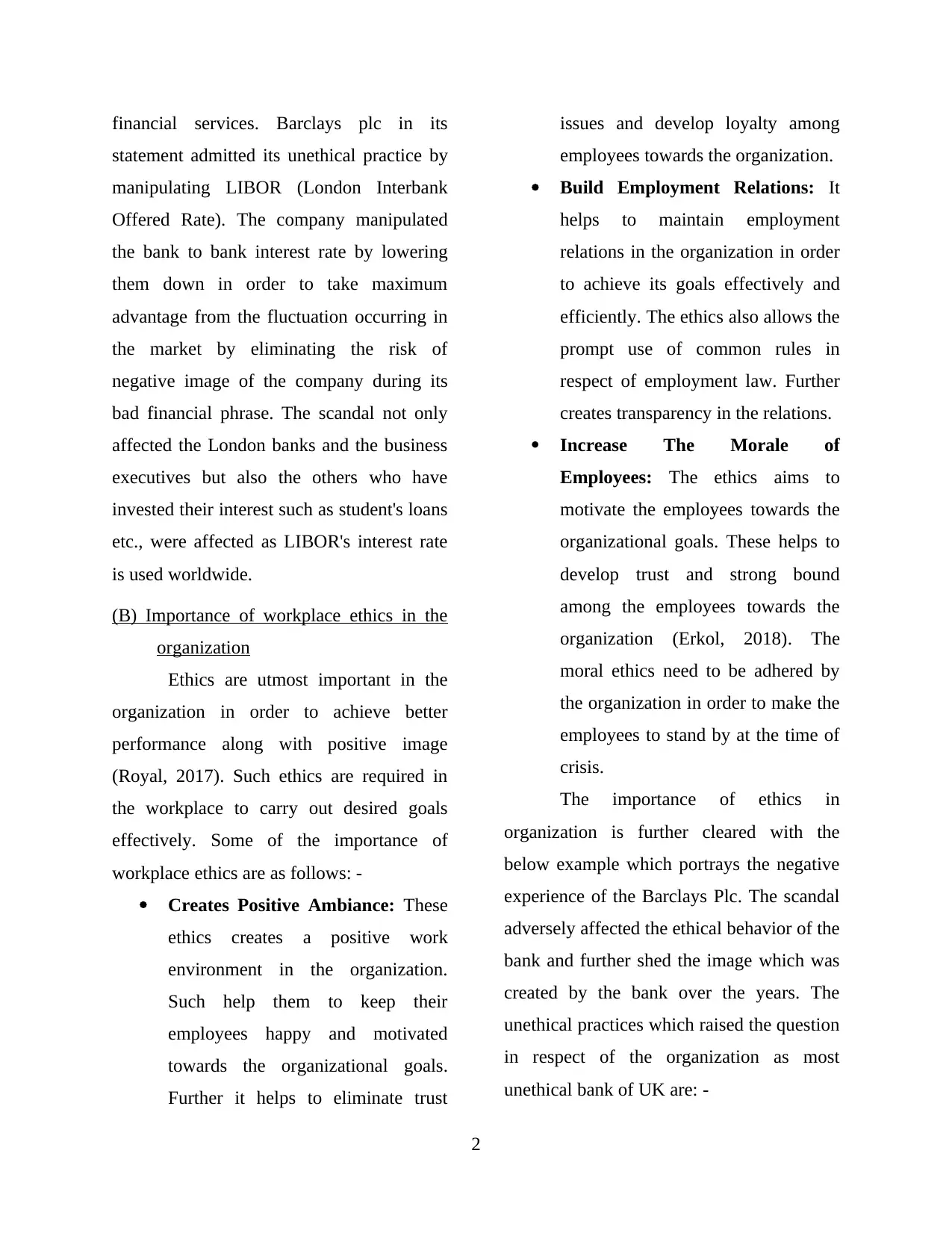
financial services. Barclays plc in its
statement admitted its unethical practice by
manipulating LIBOR (London Interbank
Offered Rate). The company manipulated
the bank to bank interest rate by lowering
them down in order to take maximum
advantage from the fluctuation occurring in
the market by eliminating the risk of
negative image of the company during its
bad financial phrase. The scandal not only
affected the London banks and the business
executives but also the others who have
invested their interest such as student's loans
etc., were affected as LIBOR's interest rate
is used worldwide.
(B) Importance of workplace ethics in the
organization
Ethics are utmost important in the
organization in order to achieve better
performance along with positive image
(Royal, 2017). Such ethics are required in
the workplace to carry out desired goals
effectively. Some of the importance of
workplace ethics are as follows: -
Creates Positive Ambiance: These
ethics creates a positive work
environment in the organization.
Such help them to keep their
employees happy and motivated
towards the organizational goals.
Further it helps to eliminate trust
issues and develop loyalty among
employees towards the organization.
Build Employment Relations: It
helps to maintain employment
relations in the organization in order
to achieve its goals effectively and
efficiently. The ethics also allows the
prompt use of common rules in
respect of employment law. Further
creates transparency in the relations.
Increase The Morale of
Employees: The ethics aims to
motivate the employees towards the
organizational goals. These helps to
develop trust and strong bound
among the employees towards the
organization (Erkol, 2018). The
moral ethics need to be adhered by
the organization in order to make the
employees to stand by at the time of
crisis.
The importance of ethics in
organization is further cleared with the
below example which portrays the negative
experience of the Barclays Plc. The scandal
adversely affected the ethical behavior of the
bank and further shed the image which was
created by the bank over the years. The
unethical practices which raised the question
in respect of the organization as most
unethical bank of UK are: -
2
statement admitted its unethical practice by
manipulating LIBOR (London Interbank
Offered Rate). The company manipulated
the bank to bank interest rate by lowering
them down in order to take maximum
advantage from the fluctuation occurring in
the market by eliminating the risk of
negative image of the company during its
bad financial phrase. The scandal not only
affected the London banks and the business
executives but also the others who have
invested their interest such as student's loans
etc., were affected as LIBOR's interest rate
is used worldwide.
(B) Importance of workplace ethics in the
organization
Ethics are utmost important in the
organization in order to achieve better
performance along with positive image
(Royal, 2017). Such ethics are required in
the workplace to carry out desired goals
effectively. Some of the importance of
workplace ethics are as follows: -
Creates Positive Ambiance: These
ethics creates a positive work
environment in the organization.
Such help them to keep their
employees happy and motivated
towards the organizational goals.
Further it helps to eliminate trust
issues and develop loyalty among
employees towards the organization.
Build Employment Relations: It
helps to maintain employment
relations in the organization in order
to achieve its goals effectively and
efficiently. The ethics also allows the
prompt use of common rules in
respect of employment law. Further
creates transparency in the relations.
Increase The Morale of
Employees: The ethics aims to
motivate the employees towards the
organizational goals. These helps to
develop trust and strong bound
among the employees towards the
organization (Erkol, 2018). The
moral ethics need to be adhered by
the organization in order to make the
employees to stand by at the time of
crisis.
The importance of ethics in
organization is further cleared with the
below example which portrays the negative
experience of the Barclays Plc. The scandal
adversely affected the ethical behavior of the
bank and further shed the image which was
created by the bank over the years. The
unethical practices which raised the question
in respect of the organization as most
unethical bank of UK are: -
2
Paraphrase This Document
Need a fresh take? Get an instant paraphrase of this document with our AI Paraphraser
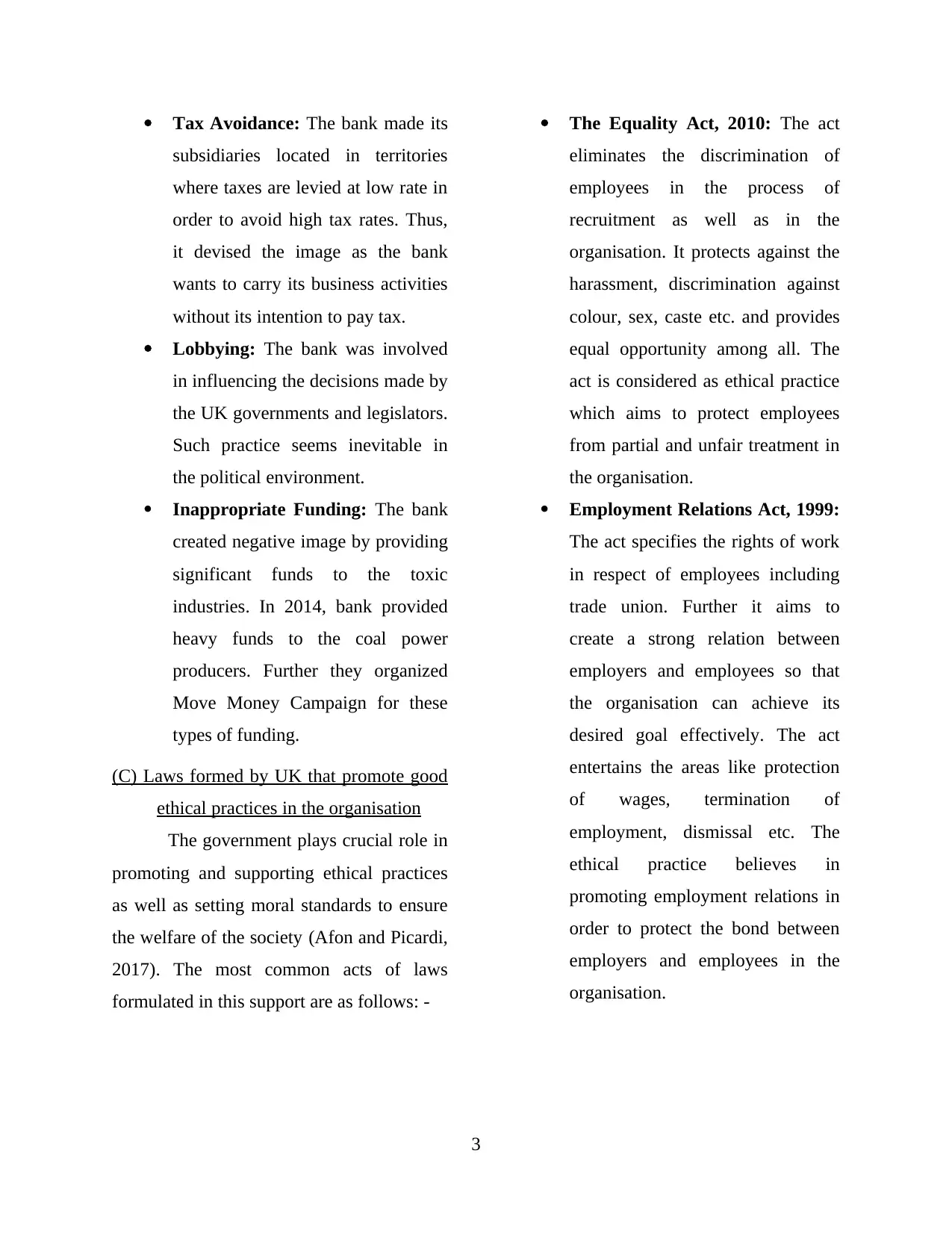
Tax Avoidance: The bank made its
subsidiaries located in territories
where taxes are levied at low rate in
order to avoid high tax rates. Thus,
it devised the image as the bank
wants to carry its business activities
without its intention to pay tax.
Lobbying: The bank was involved
in influencing the decisions made by
the UK governments and legislators.
Such practice seems inevitable in
the political environment.
Inappropriate Funding: The bank
created negative image by providing
significant funds to the toxic
industries. In 2014, bank provided
heavy funds to the coal power
producers. Further they organized
Move Money Campaign for these
types of funding.
(C) Laws formed by UK that promote good
ethical practices in the organisation
The government plays crucial role in
promoting and supporting ethical practices
as well as setting moral standards to ensure
the welfare of the society (Afon and Picardi,
2017). The most common acts of laws
formulated in this support are as follows: -
The Equality Act, 2010: The act
eliminates the discrimination of
employees in the process of
recruitment as well as in the
organisation. It protects against the
harassment, discrimination against
colour, sex, caste etc. and provides
equal opportunity among all. The
act is considered as ethical practice
which aims to protect employees
from partial and unfair treatment in
the organisation.
Employment Relations Act, 1999:
The act specifies the rights of work
in respect of employees including
trade union. Further it aims to
create a strong relation between
employers and employees so that
the organisation can achieve its
desired goal effectively. The act
entertains the areas like protection
of wages, termination of
employment, dismissal etc. The
ethical practice believes in
promoting employment relations in
order to protect the bond between
employers and employees in the
organisation.
3
subsidiaries located in territories
where taxes are levied at low rate in
order to avoid high tax rates. Thus,
it devised the image as the bank
wants to carry its business activities
without its intention to pay tax.
Lobbying: The bank was involved
in influencing the decisions made by
the UK governments and legislators.
Such practice seems inevitable in
the political environment.
Inappropriate Funding: The bank
created negative image by providing
significant funds to the toxic
industries. In 2014, bank provided
heavy funds to the coal power
producers. Further they organized
Move Money Campaign for these
types of funding.
(C) Laws formed by UK that promote good
ethical practices in the organisation
The government plays crucial role in
promoting and supporting ethical practices
as well as setting moral standards to ensure
the welfare of the society (Afon and Picardi,
2017). The most common acts of laws
formulated in this support are as follows: -
The Equality Act, 2010: The act
eliminates the discrimination of
employees in the process of
recruitment as well as in the
organisation. It protects against the
harassment, discrimination against
colour, sex, caste etc. and provides
equal opportunity among all. The
act is considered as ethical practice
which aims to protect employees
from partial and unfair treatment in
the organisation.
Employment Relations Act, 1999:
The act specifies the rights of work
in respect of employees including
trade union. Further it aims to
create a strong relation between
employers and employees so that
the organisation can achieve its
desired goal effectively. The act
entertains the areas like protection
of wages, termination of
employment, dismissal etc. The
ethical practice believes in
promoting employment relations in
order to protect the bond between
employers and employees in the
organisation.
3
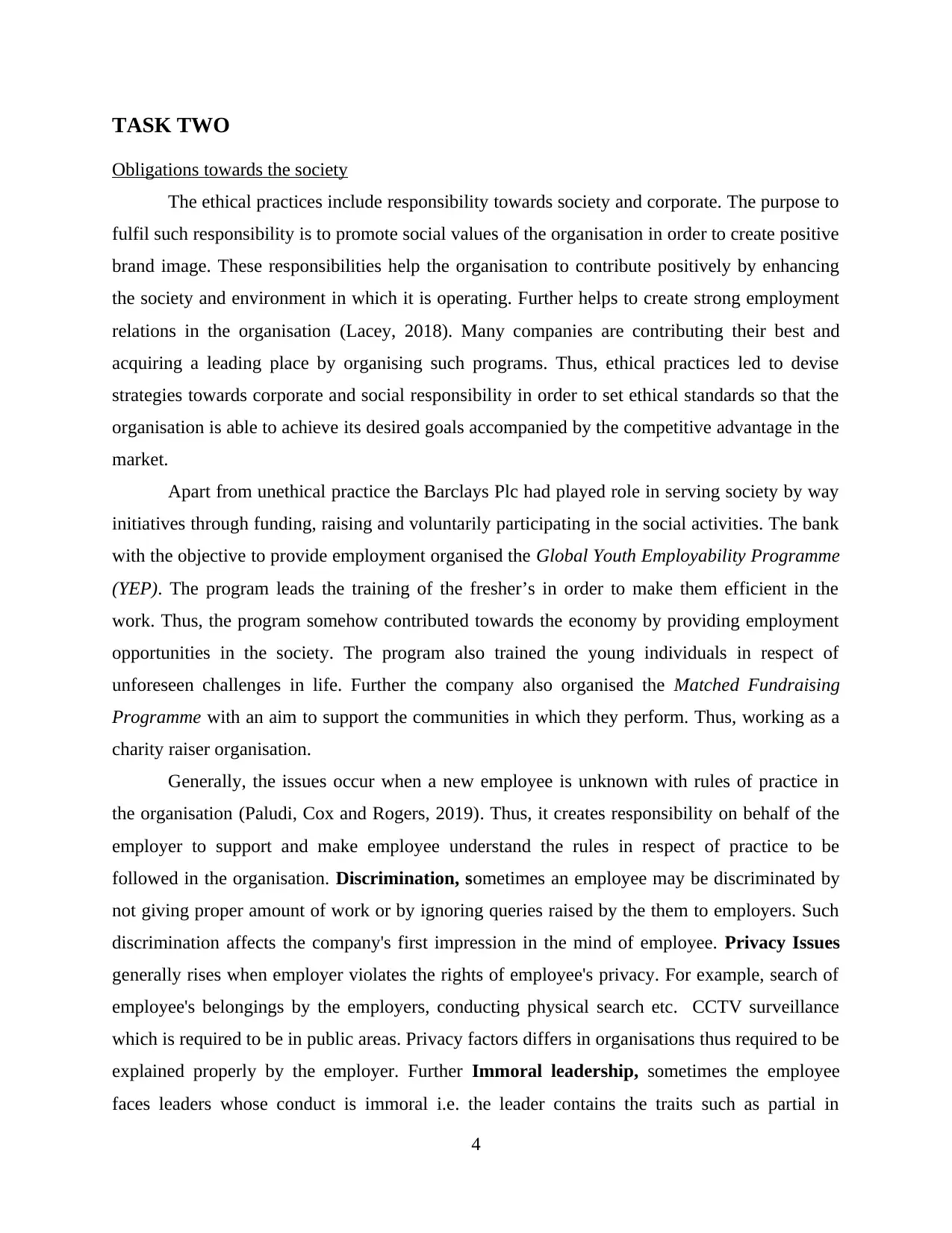
TASK TWO
Obligations towards the society
The ethical practices include responsibility towards society and corporate. The purpose to
fulfil such responsibility is to promote social values of the organisation in order to create positive
brand image. These responsibilities help the organisation to contribute positively by enhancing
the society and environment in which it is operating. Further helps to create strong employment
relations in the organisation (Lacey, 2018). Many companies are contributing their best and
acquiring a leading place by organising such programs. Thus, ethical practices led to devise
strategies towards corporate and social responsibility in order to set ethical standards so that the
organisation is able to achieve its desired goals accompanied by the competitive advantage in the
market.
Apart from unethical practice the Barclays Plc had played role in serving society by way
initiatives through funding, raising and voluntarily participating in the social activities. The bank
with the objective to provide employment organised the Global Youth Employability Programme
(YEP). The program leads the training of the fresher’s in order to make them efficient in the
work. Thus, the program somehow contributed towards the economy by providing employment
opportunities in the society. The program also trained the young individuals in respect of
unforeseen challenges in life. Further the company also organised the Matched Fundraising
Programme with an aim to support the communities in which they perform. Thus, working as a
charity raiser organisation.
Generally, the issues occur when a new employee is unknown with rules of practice in
the organisation (Paludi, Cox and Rogers, 2019). Thus, it creates responsibility on behalf of the
employer to support and make employee understand the rules in respect of practice to be
followed in the organisation. Discrimination, sometimes an employee may be discriminated by
not giving proper amount of work or by ignoring queries raised by the them to employers. Such
discrimination affects the company's first impression in the mind of employee. Privacy Issues
generally rises when employer violates the rights of employee's privacy. For example, search of
employee's belongings by the employers, conducting physical search etc. CCTV surveillance
which is required to be in public areas. Privacy factors differs in organisations thus required to be
explained properly by the employer. Further Immoral leadership, sometimes the employee
faces leaders whose conduct is immoral i.e. the leader contains the traits such as partial in
4
Obligations towards the society
The ethical practices include responsibility towards society and corporate. The purpose to
fulfil such responsibility is to promote social values of the organisation in order to create positive
brand image. These responsibilities help the organisation to contribute positively by enhancing
the society and environment in which it is operating. Further helps to create strong employment
relations in the organisation (Lacey, 2018). Many companies are contributing their best and
acquiring a leading place by organising such programs. Thus, ethical practices led to devise
strategies towards corporate and social responsibility in order to set ethical standards so that the
organisation is able to achieve its desired goals accompanied by the competitive advantage in the
market.
Apart from unethical practice the Barclays Plc had played role in serving society by way
initiatives through funding, raising and voluntarily participating in the social activities. The bank
with the objective to provide employment organised the Global Youth Employability Programme
(YEP). The program leads the training of the fresher’s in order to make them efficient in the
work. Thus, the program somehow contributed towards the economy by providing employment
opportunities in the society. The program also trained the young individuals in respect of
unforeseen challenges in life. Further the company also organised the Matched Fundraising
Programme with an aim to support the communities in which they perform. Thus, working as a
charity raiser organisation.
Generally, the issues occur when a new employee is unknown with rules of practice in
the organisation (Paludi, Cox and Rogers, 2019). Thus, it creates responsibility on behalf of the
employer to support and make employee understand the rules in respect of practice to be
followed in the organisation. Discrimination, sometimes an employee may be discriminated by
not giving proper amount of work or by ignoring queries raised by the them to employers. Such
discrimination affects the company's first impression in the mind of employee. Privacy Issues
generally rises when employer violates the rights of employee's privacy. For example, search of
employee's belongings by the employers, conducting physical search etc. CCTV surveillance
which is required to be in public areas. Privacy factors differs in organisations thus required to be
explained properly by the employer. Further Immoral leadership, sometimes the employee
faces leaders whose conduct is immoral i.e. the leader contains the traits such as partial in
4
⊘ This is a preview!⊘
Do you want full access?
Subscribe today to unlock all pages.

Trusted by 1+ million students worldwide
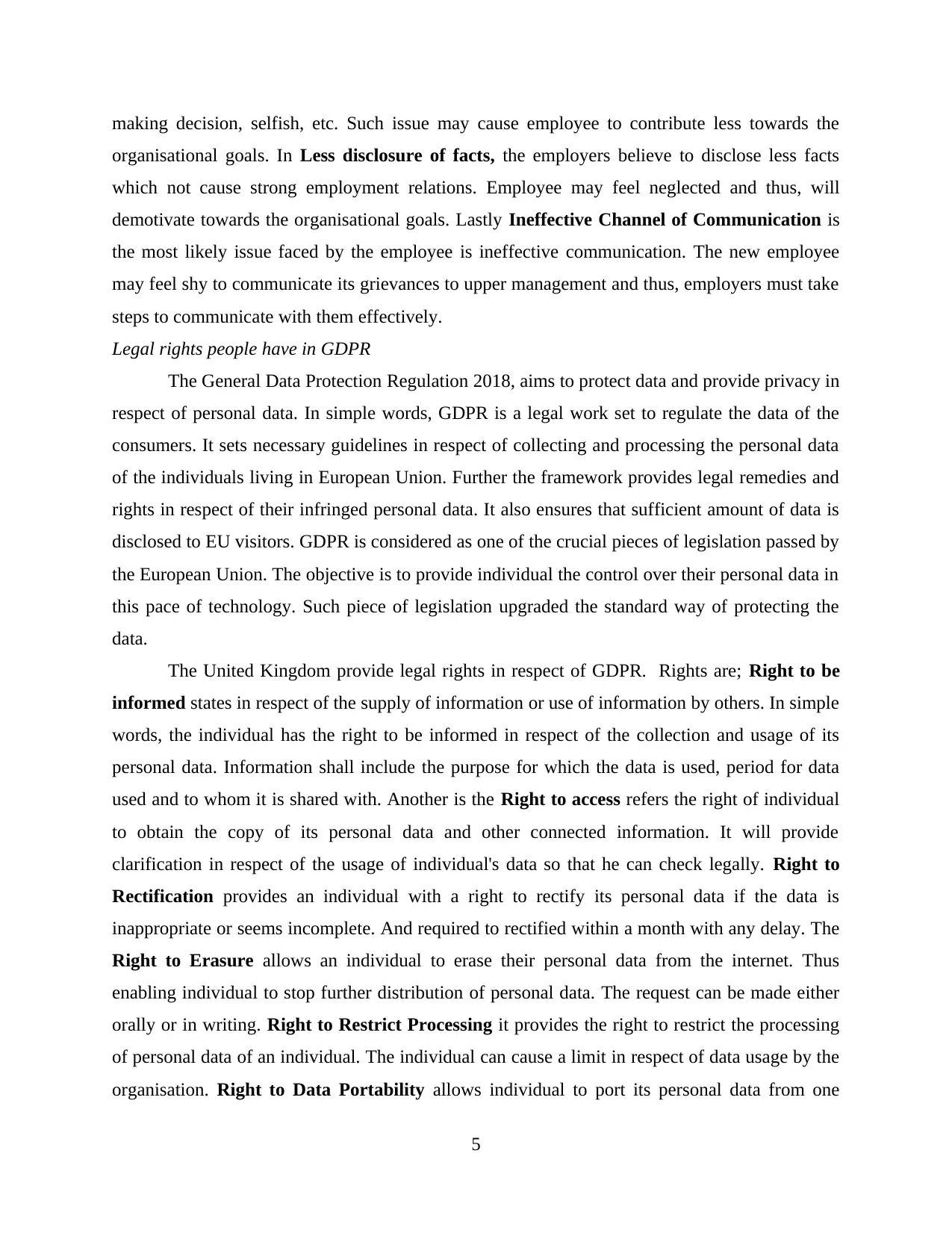
making decision, selfish, etc. Such issue may cause employee to contribute less towards the
organisational goals. In Less disclosure of facts, the employers believe to disclose less facts
which not cause strong employment relations. Employee may feel neglected and thus, will
demotivate towards the organisational goals. Lastly Ineffective Channel of Communication is
the most likely issue faced by the employee is ineffective communication. The new employee
may feel shy to communicate its grievances to upper management and thus, employers must take
steps to communicate with them effectively.
Legal rights people have in GDPR
The General Data Protection Regulation 2018, aims to protect data and provide privacy in
respect of personal data. In simple words, GDPR is a legal work set to regulate the data of the
consumers. It sets necessary guidelines in respect of collecting and processing the personal data
of the individuals living in European Union. Further the framework provides legal remedies and
rights in respect of their infringed personal data. It also ensures that sufficient amount of data is
disclosed to EU visitors. GDPR is considered as one of the crucial pieces of legislation passed by
the European Union. The objective is to provide individual the control over their personal data in
this pace of technology. Such piece of legislation upgraded the standard way of protecting the
data.
The United Kingdom provide legal rights in respect of GDPR. Rights are; Right to be
informed states in respect of the supply of information or use of information by others. In simple
words, the individual has the right to be informed in respect of the collection and usage of its
personal data. Information shall include the purpose for which the data is used, period for data
used and to whom it is shared with. Another is the Right to access refers the right of individual
to obtain the copy of its personal data and other connected information. It will provide
clarification in respect of the usage of individual's data so that he can check legally. Right to
Rectification provides an individual with a right to rectify its personal data if the data is
inappropriate or seems incomplete. And required to rectified within a month with any delay. The
Right to Erasure allows an individual to erase their personal data from the internet. Thus
enabling individual to stop further distribution of personal data. The request can be made either
orally or in writing. Right to Restrict Processing it provides the right to restrict the processing
of personal data of an individual. The individual can cause a limit in respect of data usage by the
organisation. Right to Data Portability allows individual to port its personal data from one
5
organisational goals. In Less disclosure of facts, the employers believe to disclose less facts
which not cause strong employment relations. Employee may feel neglected and thus, will
demotivate towards the organisational goals. Lastly Ineffective Channel of Communication is
the most likely issue faced by the employee is ineffective communication. The new employee
may feel shy to communicate its grievances to upper management and thus, employers must take
steps to communicate with them effectively.
Legal rights people have in GDPR
The General Data Protection Regulation 2018, aims to protect data and provide privacy in
respect of personal data. In simple words, GDPR is a legal work set to regulate the data of the
consumers. It sets necessary guidelines in respect of collecting and processing the personal data
of the individuals living in European Union. Further the framework provides legal remedies and
rights in respect of their infringed personal data. It also ensures that sufficient amount of data is
disclosed to EU visitors. GDPR is considered as one of the crucial pieces of legislation passed by
the European Union. The objective is to provide individual the control over their personal data in
this pace of technology. Such piece of legislation upgraded the standard way of protecting the
data.
The United Kingdom provide legal rights in respect of GDPR. Rights are; Right to be
informed states in respect of the supply of information or use of information by others. In simple
words, the individual has the right to be informed in respect of the collection and usage of its
personal data. Information shall include the purpose for which the data is used, period for data
used and to whom it is shared with. Another is the Right to access refers the right of individual
to obtain the copy of its personal data and other connected information. It will provide
clarification in respect of the usage of individual's data so that he can check legally. Right to
Rectification provides an individual with a right to rectify its personal data if the data is
inappropriate or seems incomplete. And required to rectified within a month with any delay. The
Right to Erasure allows an individual to erase their personal data from the internet. Thus
enabling individual to stop further distribution of personal data. The request can be made either
orally or in writing. Right to Restrict Processing it provides the right to restrict the processing
of personal data of an individual. The individual can cause a limit in respect of data usage by the
organisation. Right to Data Portability allows individual to port its personal data from one
5
Paraphrase This Document
Need a fresh take? Get an instant paraphrase of this document with our AI Paraphraser
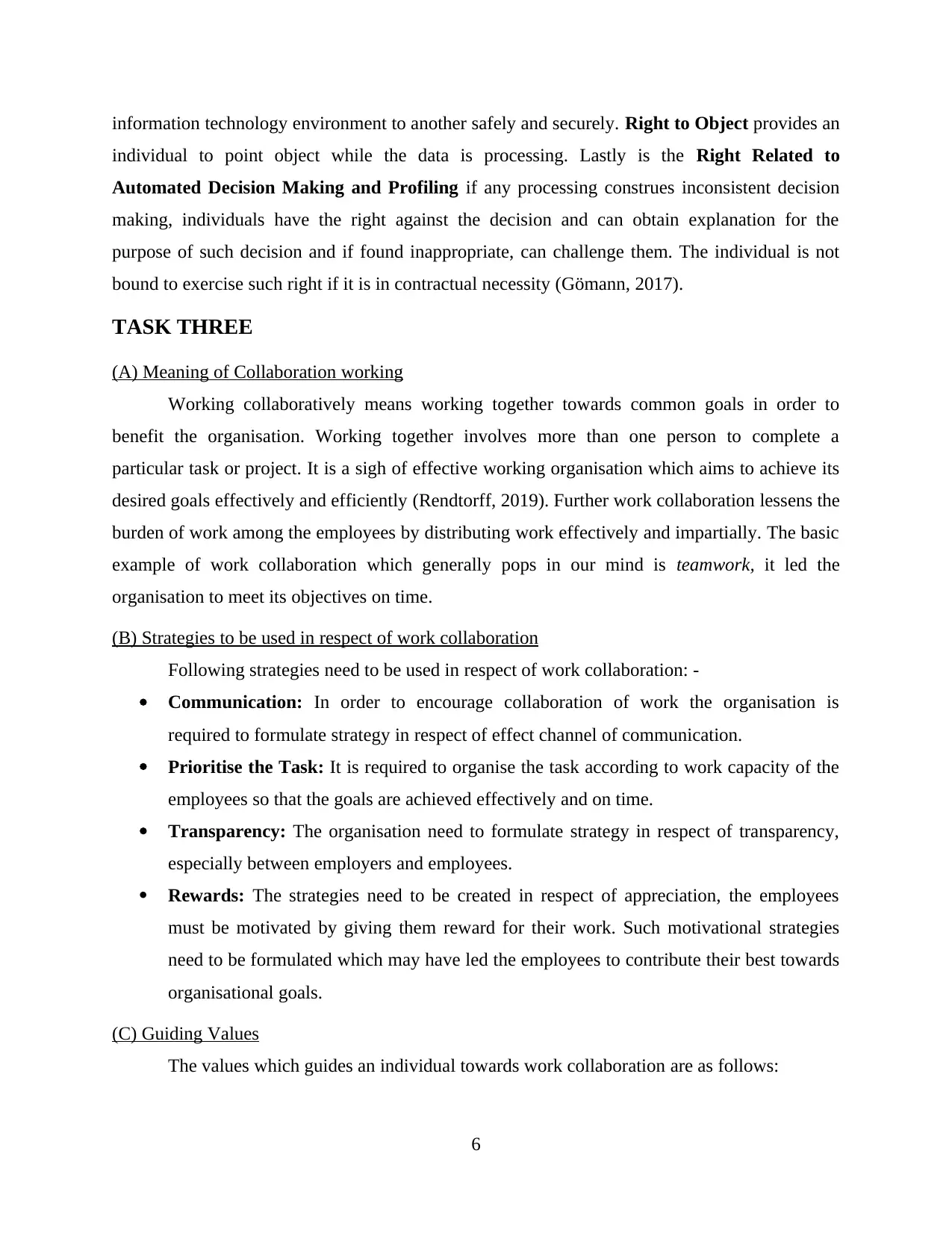
information technology environment to another safely and securely. Right to Object provides an
individual to point object while the data is processing. Lastly is the Right Related to
Automated Decision Making and Profiling if any processing construes inconsistent decision
making, individuals have the right against the decision and can obtain explanation for the
purpose of such decision and if found inappropriate, can challenge them. The individual is not
bound to exercise such right if it is in contractual necessity (Gömann, 2017).
TASK THREE
(A) Meaning of Collaboration working
Working collaboratively means working together towards common goals in order to
benefit the organisation. Working together involves more than one person to complete a
particular task or project. It is a sigh of effective working organisation which aims to achieve its
desired goals effectively and efficiently (Rendtorff, 2019). Further work collaboration lessens the
burden of work among the employees by distributing work effectively and impartially. The basic
example of work collaboration which generally pops in our mind is teamwork, it led the
organisation to meet its objectives on time.
(B) Strategies to be used in respect of work collaboration
Following strategies need to be used in respect of work collaboration: -
Communication: In order to encourage collaboration of work the organisation is
required to formulate strategy in respect of effect channel of communication.
Prioritise the Task: It is required to organise the task according to work capacity of the
employees so that the goals are achieved effectively and on time.
Transparency: The organisation need to formulate strategy in respect of transparency,
especially between employers and employees.
Rewards: The strategies need to be created in respect of appreciation, the employees
must be motivated by giving them reward for their work. Such motivational strategies
need to be formulated which may have led the employees to contribute their best towards
organisational goals.
(C) Guiding Values
The values which guides an individual towards work collaboration are as follows:
6
individual to point object while the data is processing. Lastly is the Right Related to
Automated Decision Making and Profiling if any processing construes inconsistent decision
making, individuals have the right against the decision and can obtain explanation for the
purpose of such decision and if found inappropriate, can challenge them. The individual is not
bound to exercise such right if it is in contractual necessity (Gömann, 2017).
TASK THREE
(A) Meaning of Collaboration working
Working collaboratively means working together towards common goals in order to
benefit the organisation. Working together involves more than one person to complete a
particular task or project. It is a sigh of effective working organisation which aims to achieve its
desired goals effectively and efficiently (Rendtorff, 2019). Further work collaboration lessens the
burden of work among the employees by distributing work effectively and impartially. The basic
example of work collaboration which generally pops in our mind is teamwork, it led the
organisation to meet its objectives on time.
(B) Strategies to be used in respect of work collaboration
Following strategies need to be used in respect of work collaboration: -
Communication: In order to encourage collaboration of work the organisation is
required to formulate strategy in respect of effect channel of communication.
Prioritise the Task: It is required to organise the task according to work capacity of the
employees so that the goals are achieved effectively and on time.
Transparency: The organisation need to formulate strategy in respect of transparency,
especially between employers and employees.
Rewards: The strategies need to be created in respect of appreciation, the employees
must be motivated by giving them reward for their work. Such motivational strategies
need to be formulated which may have led the employees to contribute their best towards
organisational goals.
(C) Guiding Values
The values which guides an individual towards work collaboration are as follows:
6
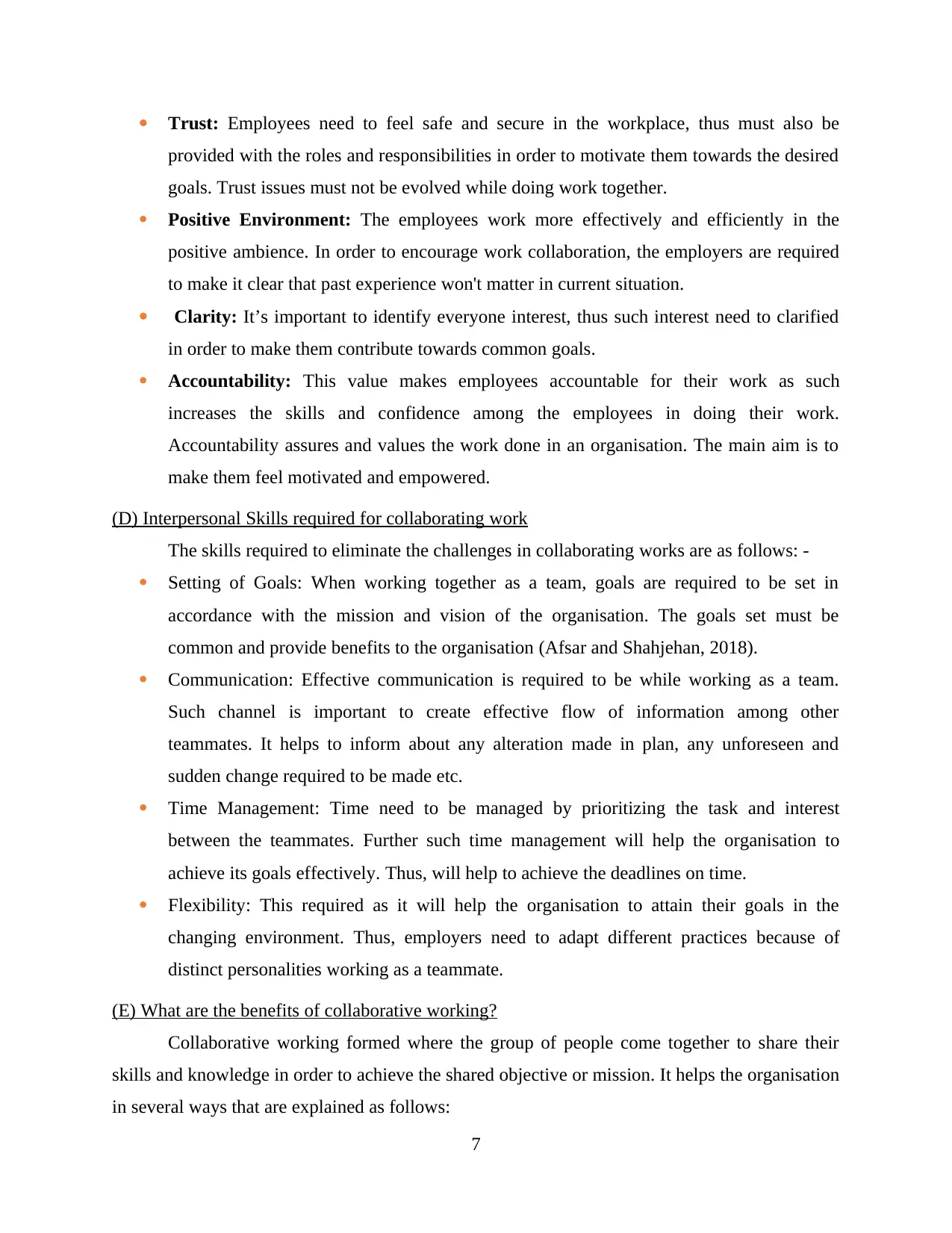
Trust: Employees need to feel safe and secure in the workplace, thus must also be
provided with the roles and responsibilities in order to motivate them towards the desired
goals. Trust issues must not be evolved while doing work together.
Positive Environment: The employees work more effectively and efficiently in the
positive ambience. In order to encourage work collaboration, the employers are required
to make it clear that past experience won't matter in current situation.
Clarity: It’s important to identify everyone interest, thus such interest need to clarified
in order to make them contribute towards common goals.
Accountability: This value makes employees accountable for their work as such
increases the skills and confidence among the employees in doing their work.
Accountability assures and values the work done in an organisation. The main aim is to
make them feel motivated and empowered.
(D) Interpersonal Skills required for collaborating work
The skills required to eliminate the challenges in collaborating works are as follows: -
Setting of Goals: When working together as a team, goals are required to be set in
accordance with the mission and vision of the organisation. The goals set must be
common and provide benefits to the organisation (Afsar and Shahjehan, 2018).
Communication: Effective communication is required to be while working as a team.
Such channel is important to create effective flow of information among other
teammates. It helps to inform about any alteration made in plan, any unforeseen and
sudden change required to be made etc.
Time Management: Time need to be managed by prioritizing the task and interest
between the teammates. Further such time management will help the organisation to
achieve its goals effectively. Thus, will help to achieve the deadlines on time.
Flexibility: This required as it will help the organisation to attain their goals in the
changing environment. Thus, employers need to adapt different practices because of
distinct personalities working as a teammate.
(E) What are the benefits of collaborative working?
Collaborative working formed where the group of people come together to share their
skills and knowledge in order to achieve the shared objective or mission. It helps the organisation
in several ways that are explained as follows:
7
provided with the roles and responsibilities in order to motivate them towards the desired
goals. Trust issues must not be evolved while doing work together.
Positive Environment: The employees work more effectively and efficiently in the
positive ambience. In order to encourage work collaboration, the employers are required
to make it clear that past experience won't matter in current situation.
Clarity: It’s important to identify everyone interest, thus such interest need to clarified
in order to make them contribute towards common goals.
Accountability: This value makes employees accountable for their work as such
increases the skills and confidence among the employees in doing their work.
Accountability assures and values the work done in an organisation. The main aim is to
make them feel motivated and empowered.
(D) Interpersonal Skills required for collaborating work
The skills required to eliminate the challenges in collaborating works are as follows: -
Setting of Goals: When working together as a team, goals are required to be set in
accordance with the mission and vision of the organisation. The goals set must be
common and provide benefits to the organisation (Afsar and Shahjehan, 2018).
Communication: Effective communication is required to be while working as a team.
Such channel is important to create effective flow of information among other
teammates. It helps to inform about any alteration made in plan, any unforeseen and
sudden change required to be made etc.
Time Management: Time need to be managed by prioritizing the task and interest
between the teammates. Further such time management will help the organisation to
achieve its goals effectively. Thus, will help to achieve the deadlines on time.
Flexibility: This required as it will help the organisation to attain their goals in the
changing environment. Thus, employers need to adapt different practices because of
distinct personalities working as a teammate.
(E) What are the benefits of collaborative working?
Collaborative working formed where the group of people come together to share their
skills and knowledge in order to achieve the shared objective or mission. It helps the organisation
in several ways that are explained as follows:
7
⊘ This is a preview!⊘
Do you want full access?
Subscribe today to unlock all pages.

Trusted by 1+ million students worldwide
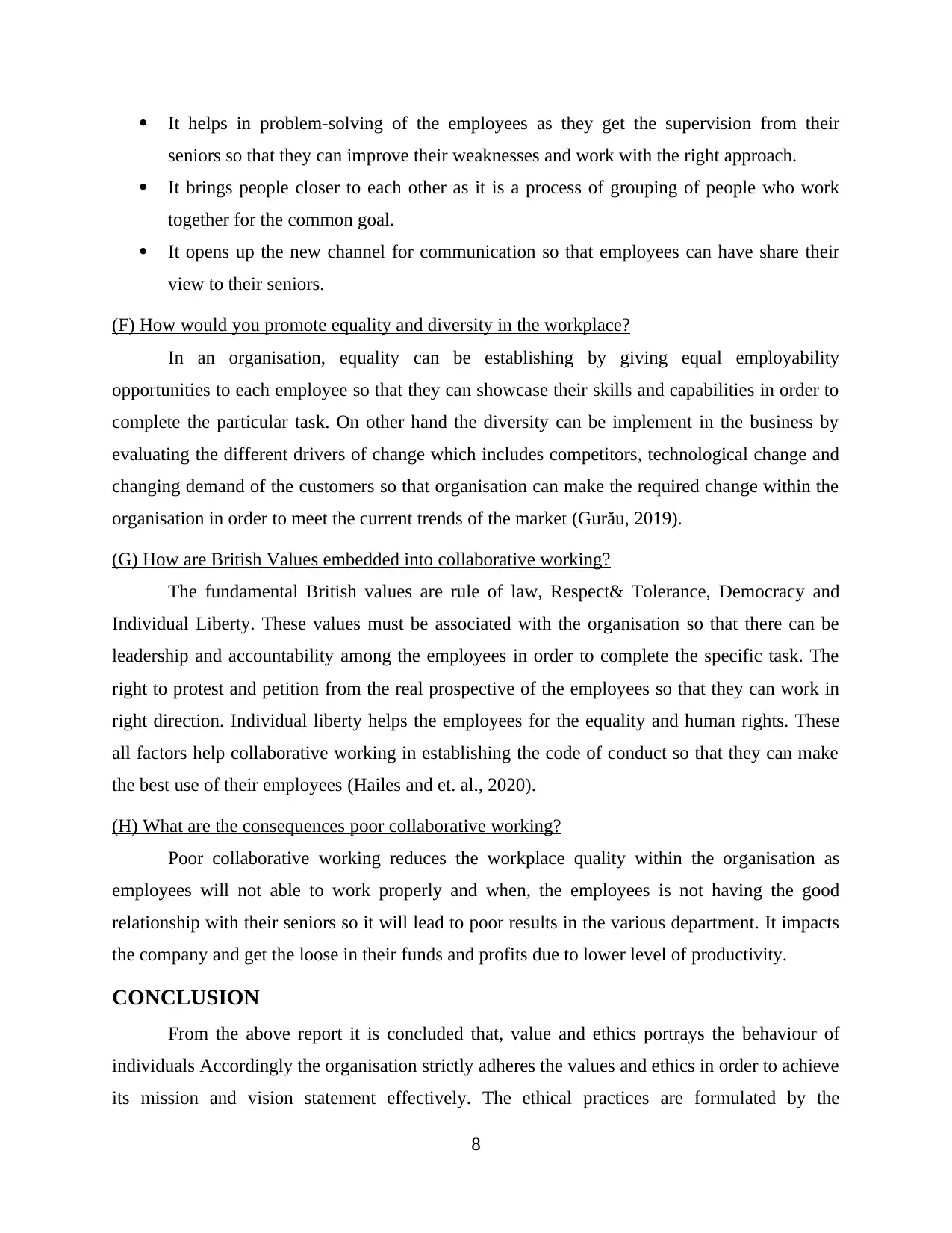
It helps in problem-solving of the employees as they get the supervision from their
seniors so that they can improve their weaknesses and work with the right approach.
It brings people closer to each other as it is a process of grouping of people who work
together for the common goal.
It opens up the new channel for communication so that employees can have share their
view to their seniors.
(F) How would you promote equality and diversity in the workplace?
In an organisation, equality can be establishing by giving equal employability
opportunities to each employee so that they can showcase their skills and capabilities in order to
complete the particular task. On other hand the diversity can be implement in the business by
evaluating the different drivers of change which includes competitors, technological change and
changing demand of the customers so that organisation can make the required change within the
organisation in order to meet the current trends of the market (Gurău, 2019).
(G) How are British Values embedded into collaborative working?
The fundamental British values are rule of law, Respect& Tolerance, Democracy and
Individual Liberty. These values must be associated with the organisation so that there can be
leadership and accountability among the employees in order to complete the specific task. The
right to protest and petition from the real prospective of the employees so that they can work in
right direction. Individual liberty helps the employees for the equality and human rights. These
all factors help collaborative working in establishing the code of conduct so that they can make
the best use of their employees (Hailes and et. al., 2020).
(H) What are the consequences poor collaborative working?
Poor collaborative working reduces the workplace quality within the organisation as
employees will not able to work properly and when, the employees is not having the good
relationship with their seniors so it will lead to poor results in the various department. It impacts
the company and get the loose in their funds and profits due to lower level of productivity.
CONCLUSION
From the above report it is concluded that, value and ethics portrays the behaviour of
individuals Accordingly the organisation strictly adheres the values and ethics in order to achieve
its mission and vision statement effectively. The ethical practices are formulated by the
8
seniors so that they can improve their weaknesses and work with the right approach.
It brings people closer to each other as it is a process of grouping of people who work
together for the common goal.
It opens up the new channel for communication so that employees can have share their
view to their seniors.
(F) How would you promote equality and diversity in the workplace?
In an organisation, equality can be establishing by giving equal employability
opportunities to each employee so that they can showcase their skills and capabilities in order to
complete the particular task. On other hand the diversity can be implement in the business by
evaluating the different drivers of change which includes competitors, technological change and
changing demand of the customers so that organisation can make the required change within the
organisation in order to meet the current trends of the market (Gurău, 2019).
(G) How are British Values embedded into collaborative working?
The fundamental British values are rule of law, Respect& Tolerance, Democracy and
Individual Liberty. These values must be associated with the organisation so that there can be
leadership and accountability among the employees in order to complete the specific task. The
right to protest and petition from the real prospective of the employees so that they can work in
right direction. Individual liberty helps the employees for the equality and human rights. These
all factors help collaborative working in establishing the code of conduct so that they can make
the best use of their employees (Hailes and et. al., 2020).
(H) What are the consequences poor collaborative working?
Poor collaborative working reduces the workplace quality within the organisation as
employees will not able to work properly and when, the employees is not having the good
relationship with their seniors so it will lead to poor results in the various department. It impacts
the company and get the loose in their funds and profits due to lower level of productivity.
CONCLUSION
From the above report it is concluded that, value and ethics portrays the behaviour of
individuals Accordingly the organisation strictly adheres the values and ethics in order to achieve
its mission and vision statement effectively. The ethical practices are formulated by the
8
Paraphrase This Document
Need a fresh take? Get an instant paraphrase of this document with our AI Paraphraser
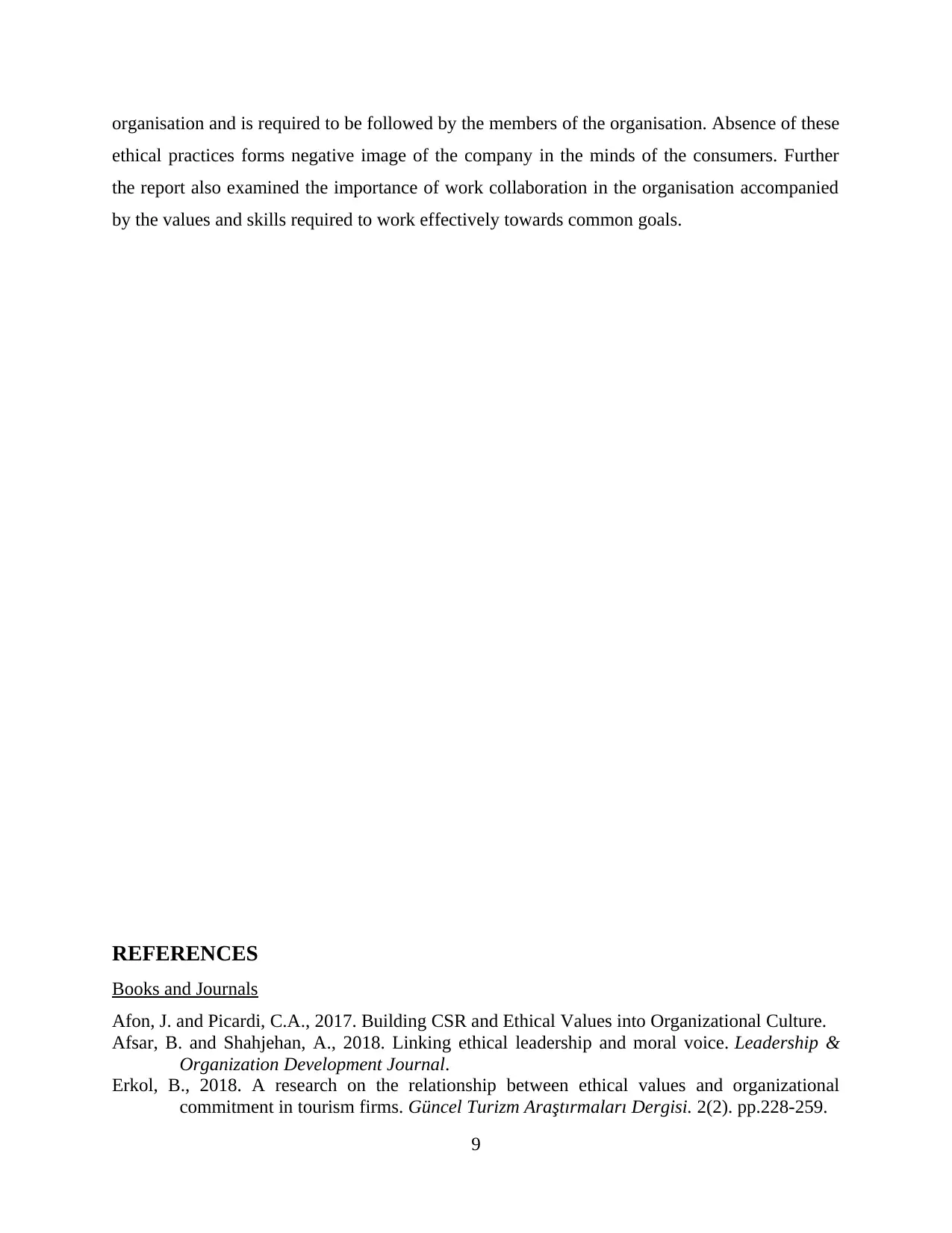
organisation and is required to be followed by the members of the organisation. Absence of these
ethical practices forms negative image of the company in the minds of the consumers. Further
the report also examined the importance of work collaboration in the organisation accompanied
by the values and skills required to work effectively towards common goals.
REFERENCES
Books and Journals
Afon, J. and Picardi, C.A., 2017. Building CSR and Ethical Values into Organizational Culture.
Afsar, B. and Shahjehan, A., 2018. Linking ethical leadership and moral voice. Leadership &
Organization Development Journal.
Erkol, B., 2018. A research on the relationship between ethical values and organizational
commitment in tourism firms. Güncel Turizm Araştırmaları Dergisi. 2(2). pp.228-259.
9
ethical practices forms negative image of the company in the minds of the consumers. Further
the report also examined the importance of work collaboration in the organisation accompanied
by the values and skills required to work effectively towards common goals.
REFERENCES
Books and Journals
Afon, J. and Picardi, C.A., 2017. Building CSR and Ethical Values into Organizational Culture.
Afsar, B. and Shahjehan, A., 2018. Linking ethical leadership and moral voice. Leadership &
Organization Development Journal.
Erkol, B., 2018. A research on the relationship between ethical values and organizational
commitment in tourism firms. Güncel Turizm Araştırmaları Dergisi. 2(2). pp.228-259.
9
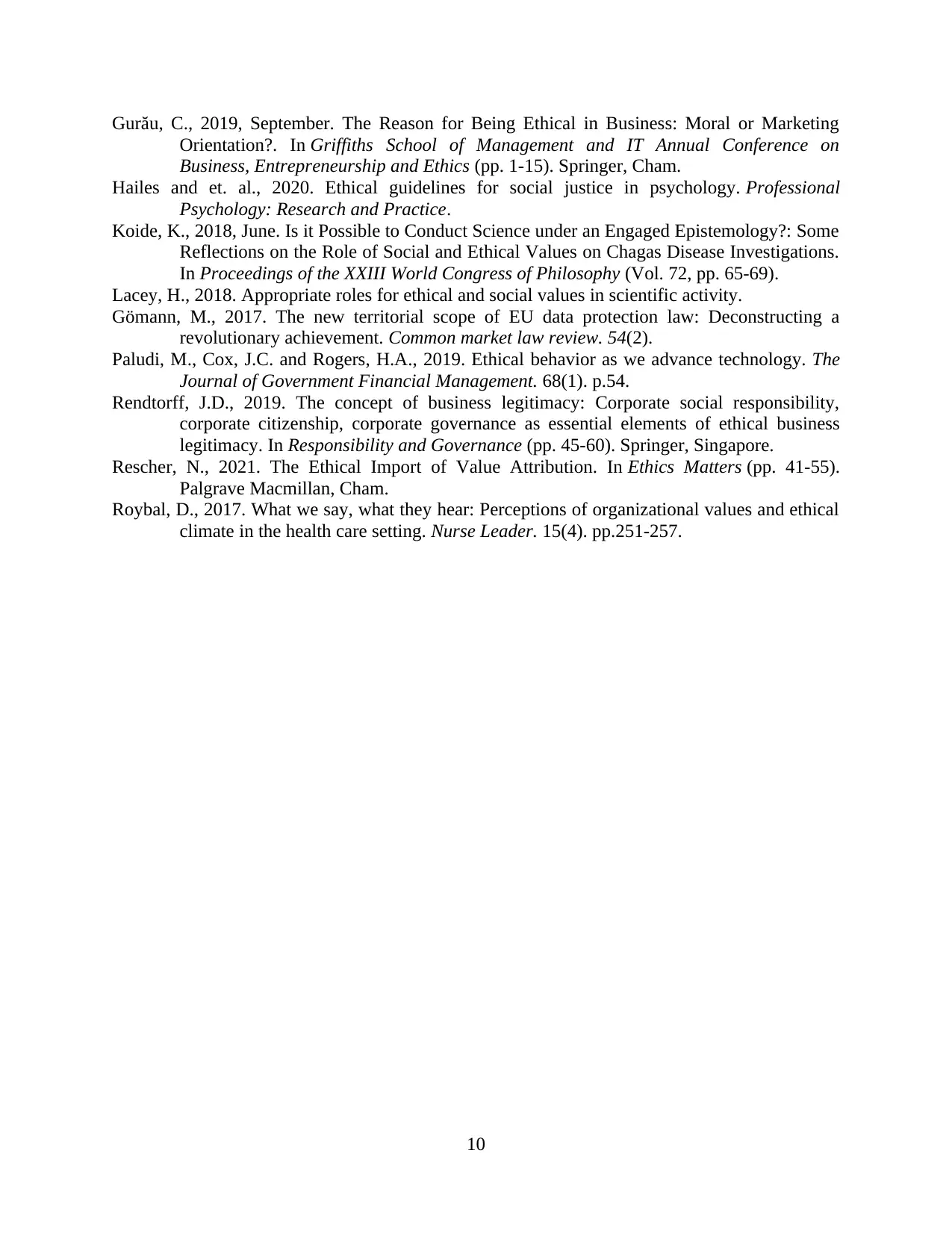
Gurău, C., 2019, September. The Reason for Being Ethical in Business: Moral or Marketing
Orientation?. In Griffiths School of Management and IT Annual Conference on
Business, Entrepreneurship and Ethics (pp. 1-15). Springer, Cham.
Hailes and et. al., 2020. Ethical guidelines for social justice in psychology. Professional
Psychology: Research and Practice.
Koide, K., 2018, June. Is it Possible to Conduct Science under an Engaged Epistemology?: Some
Reflections on the Role of Social and Ethical Values on Chagas Disease Investigations.
In Proceedings of the XXIII World Congress of Philosophy (Vol. 72, pp. 65-69).
Lacey, H., 2018. Appropriate roles for ethical and social values in scientific activity.
Gömann, M., 2017. The new territorial scope of EU data protection law: Deconstructing a
revolutionary achievement. Common market law review. 54(2).
Paludi, M., Cox, J.C. and Rogers, H.A., 2019. Ethical behavior as we advance technology. The
Journal of Government Financial Management. 68(1). p.54.
Rendtorff, J.D., 2019. The concept of business legitimacy: Corporate social responsibility,
corporate citizenship, corporate governance as essential elements of ethical business
legitimacy. In Responsibility and Governance (pp. 45-60). Springer, Singapore.
Rescher, N., 2021. The Ethical Import of Value Attribution. In Ethics Matters (pp. 41-55).
Palgrave Macmillan, Cham.
Roybal, D., 2017. What we say, what they hear: Perceptions of organizational values and ethical
climate in the health care setting. Nurse Leader. 15(4). pp.251-257.
10
Orientation?. In Griffiths School of Management and IT Annual Conference on
Business, Entrepreneurship and Ethics (pp. 1-15). Springer, Cham.
Hailes and et. al., 2020. Ethical guidelines for social justice in psychology. Professional
Psychology: Research and Practice.
Koide, K., 2018, June. Is it Possible to Conduct Science under an Engaged Epistemology?: Some
Reflections on the Role of Social and Ethical Values on Chagas Disease Investigations.
In Proceedings of the XXIII World Congress of Philosophy (Vol. 72, pp. 65-69).
Lacey, H., 2018. Appropriate roles for ethical and social values in scientific activity.
Gömann, M., 2017. The new territorial scope of EU data protection law: Deconstructing a
revolutionary achievement. Common market law review. 54(2).
Paludi, M., Cox, J.C. and Rogers, H.A., 2019. Ethical behavior as we advance technology. The
Journal of Government Financial Management. 68(1). p.54.
Rendtorff, J.D., 2019. The concept of business legitimacy: Corporate social responsibility,
corporate citizenship, corporate governance as essential elements of ethical business
legitimacy. In Responsibility and Governance (pp. 45-60). Springer, Singapore.
Rescher, N., 2021. The Ethical Import of Value Attribution. In Ethics Matters (pp. 41-55).
Palgrave Macmillan, Cham.
Roybal, D., 2017. What we say, what they hear: Perceptions of organizational values and ethical
climate in the health care setting. Nurse Leader. 15(4). pp.251-257.
10
⊘ This is a preview!⊘
Do you want full access?
Subscribe today to unlock all pages.

Trusted by 1+ million students worldwide
1 out of 12
Related Documents
Your All-in-One AI-Powered Toolkit for Academic Success.
+13062052269
info@desklib.com
Available 24*7 on WhatsApp / Email
![[object Object]](/_next/static/media/star-bottom.7253800d.svg)
Unlock your academic potential
Copyright © 2020–2026 A2Z Services. All Rights Reserved. Developed and managed by ZUCOL.





